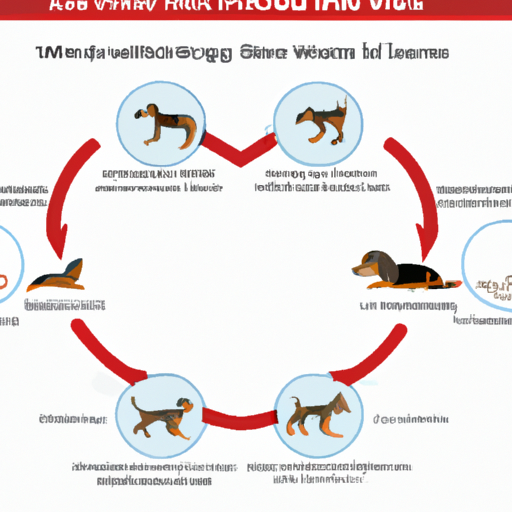As a caregiver, you know well that keeping your furry friend healthy and happy is a top priority. One of the potential threats to your dog’s health is heartworm disease. This guide will provide you with an in-depth understanding of heartworms in dogs and how you can protect your canine companion.
What is Heartworm Disease?
Heartworm disease is a severe and possibly fatal disease in pets, predominantly affecting dogs. It is caused by foot-long worms (heartworms) that live in the heart, lungs and blood vessels of affected pets, causing severe lung disease, heart failure, organ damage, and ultimately, death.
Understand that heartworm disease is not just a heart problem. It affects the entire body of your dog, impacting various organs and systems.
How Do Dogs Get Heartworms?
Heartworms are transmitted through the bites of infected mosquitoes. When a mosquito bites an infected animal, it picks up tiny heartworm larvae. These larvae mature into infective stage within the mosquito. When the infected mosquito bites another dog, the larvae are deposited onto the surface of the animal’s skin and enter the new host.
It’s important to remember:
- Heartworm disease is not contagious from one dog to another.
- The disease is only transmitted through the bite of an infected mosquito.
Heartworm Prevention
Preventing heartworm disease is far easier, safer, and cheaper than treating an infected dog. The American Heartworm Society recommends year-round heartworm prevention.
Preventive measures include:
- Regular preventative medication
- Regular testing
Most heartworm medications are given monthly and can be obtained with a veterinarian’s prescription. They come in oral, topical, or injectable forms.
| Heartworm Preventatives | Administration | Frequency |
|---|---|---|
| Oral | Pill or Chew | Monthly |
| Topical | Skin Application | Monthly |
| Injectable | Vet Administered | Every 6 months |
Symptoms and Treatment of Heartworm Disease
In the early stages of heartworm disease, many dogs show few symptoms or no symptoms at all. The longer the infection persists, the more likely symptoms will develop.
Symptoms can include:
- Mild persistent cough
- Fatigue after moderate activity
- Decreased appetite
- Weight loss
Treatment for heartworm disease can be risky for your dog and expensive for you. The goal of treatment is to kill the adult and immature worms while minimizing side effects.
Frequently Asked Questions (FAQs)
Q: Can humans get heartworms from their dogs?
A: No. Heartworms are species-specific and cannot be transmitted from dogs to humans.
Q: Is heartworm disease painful for dogs?
A: Yes. As the disease progresses, dogs may experience discomfort and pain.
Q: Can indoor dogs get heartworms?
A: Yes. Mosquitoes can get indoors, so even entirely indoor dogs are at risk.
Q: Can heartworms be prevented and treated naturally?
A: While some natural remedies may help boost your dog’s overall health, they cannot replace vet-prescribed preventatives or treatments.
In conclusion, as a caregiver, you play a crucial role in preventing heartworm disease in your dog. Regular vet checks, preventive medication, and understanding the risks are all part of responsible pet ownership. Protect your furry friend from this lethal disease.



